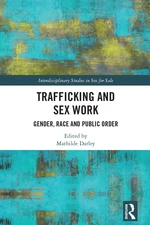Set in different national contexts (Brazil, Bulgaria, France, Germany, Laos, Norway, Thailand) and in different social science disciplines, the chapters of this volume aim at questioning anti-trafficking policies and their practical impact on sex work regulation. Many actors, from media to researchers, from nonprofit organizations to law enforcement agencies, from "experts" to "reality tourists", contribute to produce knowledge on trafficking and sexual exploitation and thus to institutionalize it as a category of thought and action; by naming and framing perpetrators and victims, they make trafficking "come true" as a public problem. The book pays particular attention to the way the international expertise produced by these different actors and institutions on sexual exploitation and sex work impacts local control practices, especially with regard to law enforcement. The fight against trafficking as it gets institutionalized and put into practice then appears as a way to reaffirm a gendered and racialized public order. Building analytical bridges between different national contexts and relying on contextualized fieldwork in different countries, the book is of great interest for academics as well as for practitioners and/or activists working on sex and gender issues and migration policies. Also, it resonates with a broader literature on the construction of public problems in sociology and political science.
Price history
Dec 31, 2022
€41.56

